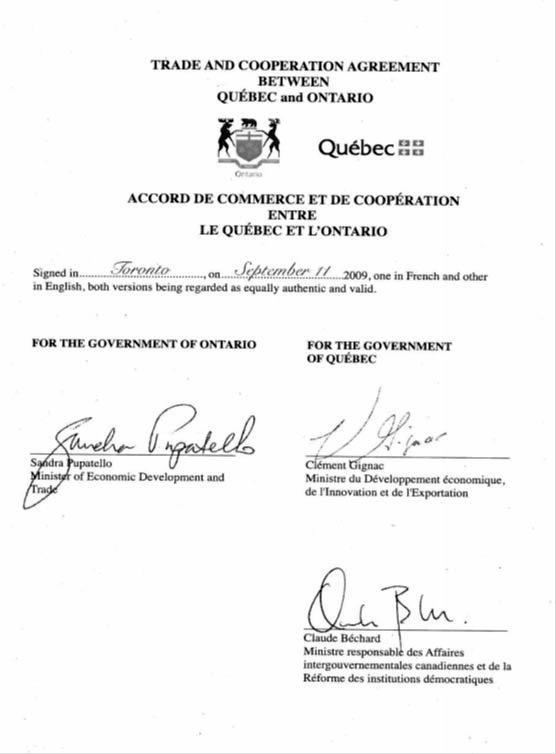Part VII: Final Provisions
Chapter Fourteen Final Provisions
Article 14.1: Accession and Withdrawal
- In accordance with Article 1800 (Trade Enhancement Agreements) of the Agreement on Internal Trade, the Parties may agree to the accession to this Agreement of any Canadian province, territory or the Federal Government upon acceptance of its terms.
- A Party may withdraw from this Agreement upon twelve (12) months written notice to the other Party.
Article 14.2: Language
The Parties acknowledge and agree that this Agreement has been made and executed in English and French and that both versions are equally authoritative.
Article 14.3: Further Negotiations and Amendments
- The Parties may enter into negotiations at any time to amend this Agreement.
- Amendments to this Agreement require the mutual consent of the Parties and must be in writing and signed by the Ministers from each Party responsible for this Agreement.
Article 14.4: Entry into Force
- This Agreement shall enter into force on October 1, 2009, except for the provisions otherwise specified in this Agreement.
- Neither Party shall, during the period beginning on the date of execution and ending on the date of entry into force of this Agreement, adopt a measure that would be inconsistent with this Agreement or amend or renew a measure in a manner that would decrease its consistency with this Agreement.
Article 14.5: Regional Economic Development
- The Parties recognize that measures adopted or maintained by a Party that are part of a general framework of regional economic development can play an important role in encouraging long-term job creation, economic growth or industrial competitiveness or in reducing economic disparities.
- Parts III (General Rules) and IV (Specific Commitments and Rules) of this Agreement do not apply to a measure adopted or maintained by a Party that is part of a general framework of regional economic development, provided that:
- the measure does not operate to impair unduly the access of persons, goods, services or investments of the other Party; and
- the measure is not more trade restrictive than necessary to achieve its specific objective.
- Each Party shall:
- within a reasonable period of time, notify the other Party of its existing programs relating to regional economic development;
- on adoption of any program relating to regional economic development, notify the other Party of that program; and
- answer rapidly, if need be, questions from the other Party on a program relating to regional economic development.
Article 14.6: Aboriginal Peoples
This Agreement does not apply to any measure adopted or maintained with respect to Aboriginal peoples.
Article 14.7: Culture, Language and Social Measures
Notwithstanding any other provision of this Agreement, except for the obligations set out in Chapter 3 (Regulatory Cooperation), any measure adopted or maintained with respect to culture, cultural industries, language requirements, education, health or social services is exempted from the provisions of this Agreement.
Article 14.8: Security Measures
For greater certainty, nothing in this Agreement shall be construed to prevent a Party from adopting or maintaining a measure relating to public security.
Article 14.9: Taxation
Nothing in this Agreement shall preclude a Party from adopting or maintaining:
- measures relating to taxation; or
- measures to secure compliance with measures relating to taxation.
Article 14.10: Non-Conforming Measures
- No Party shall amend a non-conforming measure in a manner that would further decrease the conformity of that measure with this Agreement.
- A subsequent amendment of a measure referred to in paragraph 1 may not decrease the conformity of that measure as it existed immediately prior to the subsequent amendment or renewal.
Article 14.11: Rules of Interpretation
- In this Article:
- Sector Chapter means any of the following chapters:
- Chapter 4: Energy Cooperation;
- Chapter 6: Labour Mobility;
- Chapter 7: Financial Services;
- Chapter 8: Transportation;
- Chapter 9: Public Procurement;
- Chapter 10: Agriculture and Food Goods; and
- Chapter 11: Environment and Sustainable Development.
- General Chapter means any of the following chapters:
- Chapter 2: Economic Cooperation; and
- Chapter 3: Regulatory Cooperation.
- A Sector Chapter applies to matters within its scope.
- A General Chapter applies both to matters within its scope and, where appropriate, to matters that fall within the scope of a Sector Chapter.
- In the event of an inconsistency between a Sector Chapter and a General Chapter, the Sector Chapter prevails to the extent of the inconsistency, except as otherwise provided.
- For greater certainty, in the event of an inconsistency between two Sector Chapters or between two General Chapters, reference should be made to this Agreement as a whole, including the Preamble and Chapter 1 (Objectives) to determine which Chapter prevails to the extent of the inconsistency, except as otherwise provided.
- Sector Chapter means any of the following chapters:
- In this Agreement:
- reference to an Article includes any annex referred to in that Article;
- words expressed in the singular include the plural and vice versa;
- where the words "including" or "includes" appear in this Agreement, they mean "including without limitation" and "includes without limitation"; and
- unless specified otherwise, reference in this Agreement to a statute or statutory provision refers to that statute or statutory provision as it may be amended or to any restated or successor statute or statutory provision of comparable effect. A reference to a statute includes any statutory instruments, rules and regulations made under such statute.
Article 14.12: Computing time limits
- If the day fixed for doing anything falls on a weekend or any holiday, such thing may validly be done on the next business day.
- In computing any time limit fixed by this Agreement or any of its provisions:
- the day which marks the start of the time limit is not counted, but the last day is counted; and
- weekends and holidays are counted, but when the last day falls on a weekend or on any holiday, the time limit is extended to the next business day.
